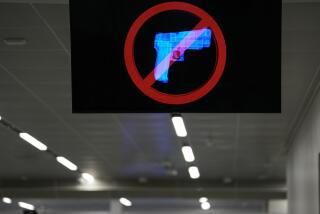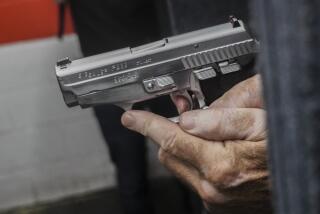High Court Limits Use of Confessions From Accomplices
- Share via
WASHINGTON — A divided Supreme Court ruled today that confessions by accomplices are so unreliable they cannot be used as key proof of another’s guilt.
The justices, on a 5-4 vote, reversed the Appellate Court of Illinois, which had held that a convicted murderer’s rights were not violated by a judge’s consideration of a co-defendant’s confession.
The ruling came in the case of Millie Lee, who was convicted along with her boyfriend, Edwin Thomas, of murdering two women in East St. Louis, Ill., in 1982.
Writing for the majority, Justice William J. Brennan Jr. said Lee’s constitutional right to confront witnesses against her was violated by the trial court’s reliance on the co-defendant’s confession as proof in determining her guilt.
‘Presumptively Suspect’
“When one person accuses another of a crime under circumstances in which the declarant stands to gain by inculpating another, the accusation is presumptively suspect and must be subject to the scrutiny of cross-examination,” Brennan wrote.
“The confrontation guarantee serves not only symbolic goals. The right to confront and cross-examine witnesses is primarily a functional right that promotes reliability in criminal trials.”
Attorneys for Illinois had unsuccessfully argued that Lee’s Sixth Amendment rights were not violated because her lawyers had declined an opportunity to cross-examine Thomas.
Although both defendants gave police similar stories about the crime, Thomas implied that Lee planned the murders. Both were convicted of two counts of first-degree murder and sentenced to life in prison.
The high court did not overturn Lee’s conviction, but returned the case to the lower court with instructions to determine if the use of Thomas’ confession was a “harmless error” in light of other evidence of Lee’s guilt.
In other cases today, the court:
--Gave gambling casinos a break in a ruling the federal government said could cost it at least $67 million in tax revenue from Nevada and New Jersey casinos. By a 7-2 vote, the court rebuffed Reagan Administration arguments and said Nevada casinos may list some potential slot machine payoffs as tax deductions.
Today’s ruling allows the casino operator to claim deductions based on the size of jackpots available in so-called progressive slot machines. Hughes Properties Inc., owner of Harolds Club casino in Reno, won a refund of $433,441 in taxes and interest covering four years ending in 1977.
--Struck down New York liquor pricing regulations that state officials said were designed to pass on discounts to consumers. By a 5-3 vote, the justices said the rules interfered with interstate commerce in violation of the Constitution.
Brown-Forman Distillers Corp. challenged a New York Liquor Authority rule concerning so-called promotional allowances, used by wholesalers to pay for advertisements. New York requires that distillers sell liquor to New York wholesalers at the lowest price the distillers charge elsewhere in the nation. New York banned promotional allowances and required that they be used to lower the price of liquor sold to New York wholesalers.
But, the high court said the New York rule in effect allowed New York to control liquor prices in other states.
More to Read
Sign up for Essential California
The most important California stories and recommendations in your inbox every morning.
You may occasionally receive promotional content from the Los Angeles Times.













